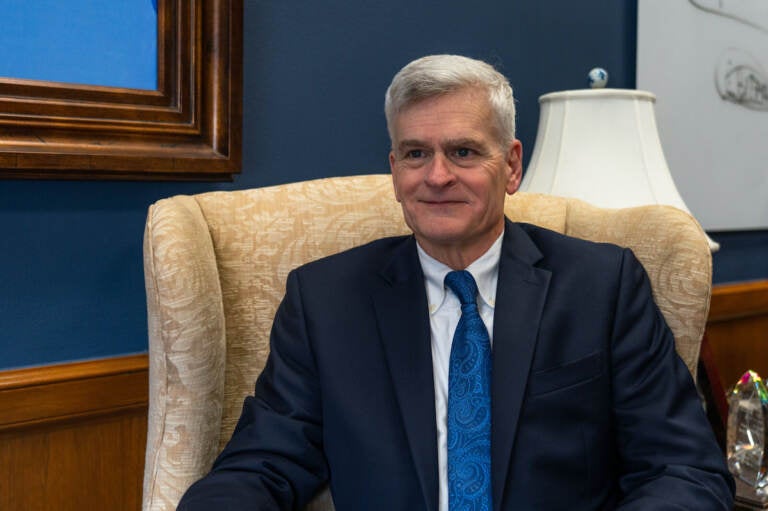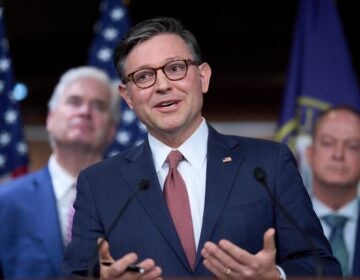Senator Cassidy offers social security depletion solution. Will it see action?

Susan Davis interviews Senator Cassidy at Dirksen in Washington, D.C. on May 10, 2023. (Catie Dull/NPR)
Sen. Bill Cassidy, a gastroenterologist by trade, is comfortable doing uncomfortable things, so it’s no surprise he’s trying to lead an effort in Congress to protect Social Security, commonly referred to as the “third rail” of American politics. In other words: Anyone who tries to touch it, gets burned.
“The third rail should be that you’re going to sit passively while the program goes insolvent, at which points benefits are cut,” the Louisiana Republican, 66, told NPR in an interview in his Senate office. “I’m trying to stop those cuts. Allowing the cuts should be the third rail.”
Cassidy is an equal opportunity critic of President Joe Biden and former President Donald Trump — currently the frontrunner for the GOP nomination — because both men are campaigning to protect Social Security but not offering much of anything on how they plan to do it.
“If I sound aggravated as heck, we’ve got a program that’s going insolvent in eight to nine years,” Cassidy said, noting the resulting cut could see poverty among the elderly nearly double. “And we have the leading presidential candidates acting like there’s not a problem.”
The problem with Social Security
If Washington does nothing, in about a decade, Social Security will start to run out of money. It’s funded by workers’ taxes and any surpluses or interest earnings in its trust fund. The program cannot borrow money on its behalf, so the only option once existing funds are exhausted would be an estimated 24% benefits cut for recipients. Nearly everyone over the age of 65 in the U.S. receives some form of Social Security benefit.
It’s unlikely Washington will let it get to that point — Social Security is wildly popular and economically crucial for most Americans — but few in positions of power are actually trying to come up with a fix to actually prevent it from happening.
About two years ago, Cassidy decided to start working on it.
“It suddenly occurred to me that we could address this by creating an investment fund,” he said “And if we did that, it would be a way to address the shortfall and to limit or to prevent this 24% decrease [in benefits].”
He linked up with independent Sen. Angus King of Maine, who caucuses with Democrats, and who Cassidy praised as a “tremendous partner.” They began to approach senators one-by-one to pitch them on their “big idea,” as Cassidy calls it.
The pitch goes like this: Invest $1.5 trillion over five years in an independent investment fund separate from Social Security.
“Now, you let it sit there for 70 years and you allow it to grow,” Cassidy said. “It blossoms and eventually becomes adequate to pay for 75% of the liabilities of the Social Security trust fund.”
The government would have to borrow money to pay for scheduled benefits. “But you’re borrowing money against the money which is in the fund, so it decreases the risk of our debt and deficit,”Cassidy explained.
The fund would be managed independently of Congress with the explicit intention of preventing future political interference.
Cassidy concedes his plan only partially solves the solvency problem — it does not address the tougher questions about raising taxes or the retirement age, but he said at a minimum it will not raise taxes on seniors or affect anyone close to retirement. “Then you need political consensus,” he admitted.
His message to skeptics? “I just tell people, ‘You may not like our plan. Come up with a better option.’ ”
Seeking political consensus
Cassidy and his staff have been working Washington channels through lobbying shops, think tanks and economic gurus to get feedback and make changes as they go, all in the name of building that consensus. “I could give you a list of probably 50 different entities on the right and the left that we went to speak to to either build support or to learn from them,” he said. “And the final product is robust.”
It’s also still amorphous. While it is no secret to what Cassidy is working on, there’s also no official legislative text, and no plans to have any hearings.
“Until a president chooses to show leadership, there’s no reason to have a hearing,” he said. “It will become fodder for somebody running for reelection who would rather be irresponsible with the future of the United States, as opposed to being honest with the American people and coming up with an innovative solution.”
There was a short window where Cassidy thought Biden might engage on Social Security after the 2022 midterms because Cassidy believes divided government is the only way to advance bipartisan legislation that affects entitlement programs.
“Ultimately, [the White House] decided that the president is going to run for reelection accusing Republicans of wanting to destroy Social Security. He made that clear in his State of the Union speech,” Cassidy said.
While he says he will vote Republican in 2024, he’s already made it clear he will not vote for Trump if he is the party’s nominee. Cassidy was one of seven Senate Republicans who voted to convict Trump in the Senate impeachment trial for his role in inciting the Jan. 6 attack on the U.S. Capitol. Whether or not being an opponent of the most popular man in the Republican Party will make it difficult to advance policy ideas within that same party, Cassidy shrugs.
“Scripture says that today’s own troubles be sufficient for the day. I can worry all I want to about tomorrow. My goal is today.”
For now, Cassidy and his allies are waiting for their moment, which will come sometime after the 2024 election and sometime before Social Security hits insolvency in about a decade. He said he intends to spend the rest of his time in Congress trying to solve it. He faces reelection in 2026.
“I’m here to do something, not to be something,” he said. “And if we can do something — wow. On my epitaph, it’ll be several things listed, but one of them will be: Worked with others to fix Social Security.”
9(MDAzMzI1ODY3MDEyMzkzOTE3NjIxNDg3MQ001))




